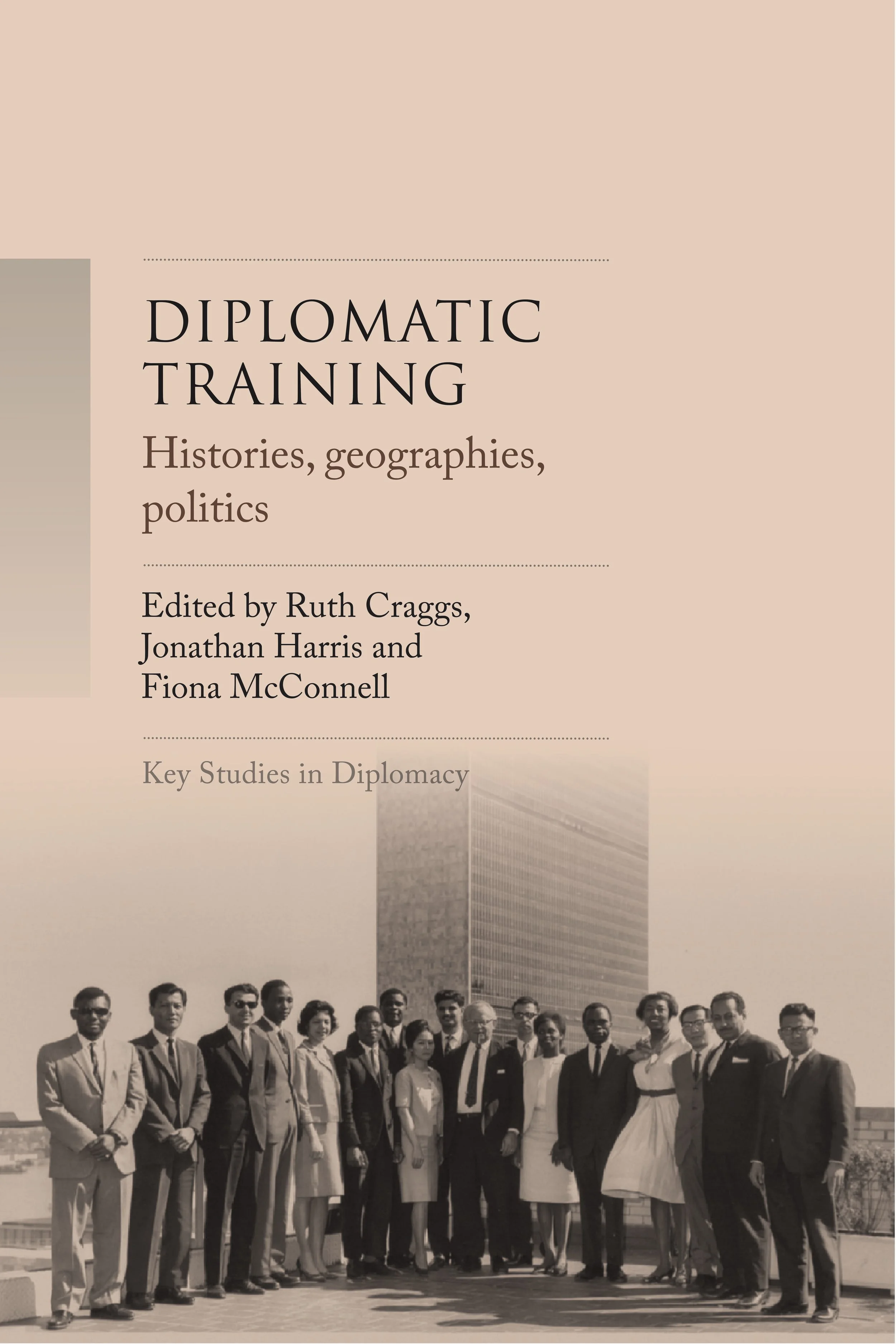Diplomatic Training: Histories, geographies, politics
Over the course of the Training Diplomats project, we have had the privilege of working with several wonderful scholars and practitioners working in the field of diplomatic training. In particular, we had the opportunity to convene a workshop on the subject in London in 2023, which began a collective effort to produce the first book of scholarly work on the subject, now published with the Key Studies in Diplomacy series at Manchester University Press.
Bringing together detailed accounts of the histories, development and contemporary practices of diplomatic training with insights from key practitioners, this edited collection places training centrally within our understanding of international relations. It argues that diplomatic training both reflects and reproduces hegemonic power relations, whilst offering opportunities to contest them, and imagine alternative futures. The book includes a substantive introduction, nine full-length chapters from a range of disciplinary and regional perspectives drawing on archival research, oral history, interviews, and ethnographic methods, and four 'interventions': reflection pieces from trainers and directors of training programmes. It offers a unique, globe-spanning, interdisciplinary account of the politics of diplomatic training.
Endorsements of the book
'With their broad and illuminating perspective, Ruth Craggs, Jonathan Harris and Fiona McConnell draw on legal, historical and political studies of the European experience to offer a fresh and global approach to the content, sites and power dynamics of diplomatic training. Bringing together specialists in the field and practitioners to discuss the approaches proposed in their remarkable introduction, they take the reader from the 1960s to the 2020s, from Africa to Latin America, via Iran and the Balkans. This pioneering book, which will be very useful for anyone involved in diplomatic academies and other training institutes, is also expected to become a reference work for historians.'
Laurence Badel, Paris 1 Panthéon-Sorbonne
'For a profession historically associated with tact, charm, and judgements of "taste" - all regarded as redoubts of elite privilege and stubbornly untrainable - the rise of formal diplomatic training in the twentieth century, especially since decolonization, should have attracted widespread scholarly interest and attention. This hasn't been the case, and that makes this new book a major contribution to the study of diplomacy and international relations. Over 9 chapters by scholars and 7 "reflection pieces" from practitioners, this edited book uses up-close pedagogic encounters of diplomatic training across world regions to examine how training bureaucratically includes and excludes; produces and performs the "international"; and funnels hegemonic visions of the world yet also allows actors to contest these visions. With its empirically rich chapters and far-reaching insights, the book will be of interest to a wide range of readers in the humanities and social sciences.'
Deepak Nair, Australian National University
Table of Contents
Introduction: Theorising diplomatic training - Ruth Craggs, Jonathan Harris and Fiona McConnell
Part I: Diplomatic training in the context of evolving geopolitics
Learning internationalism: constructing identity through diplomatic training - Geoffrey Wiseman and Yolanda Spies
Remembering diplomatic training in Africa, 1976-1990 - Guy Martin
Rethinking Diplomatic Training: Adapting to a Changing World - Ron Ton
Sites and Spaces in Diplomatic Training in Kenya: The Case of the Department of Diplomacy and International Studies, University of Nairobi - Patrick Maluki and Rebecca Sangura
From Art to Academia: Diplomacy in UK Higher Education - Lesley Masters a d Helen Drake
Historical Evolutions of Diplomatic Training in Iran: Diplomatic Continuities amidst Domestic Changes and Global Transformations - Alireza Shams Lahijani and Nasrin Mosaffa
Clingendael Academy: Shaping Diplomacy in South Africa's Transformative Years - Ron Ton
Part II: The pedagogies and politics of diplomatic training
Becoming a Diplomat: The history and present of diplomatic training in Norway - Øyvind Svendsen & Halvard Leira
Ethnic Diplomats and Failed Inclusion in Ecuador - María Moreno and Fernando Garcia
Brazil's next generation of Indigenous diplomats - Cibele Reschke de Borba Bengtson
The politics of international diplomatic training: Representation and socialisation in programmes for diplomats from the Balkans - Tobias Wille
Training 'Unrepresented Diplomats' - Mercè Monje Cano and Fiona McConnell
The pedagogy of defence diplomacy: tensions and themes in the training of British defence attachés - An Jacobs and Tim Archer
Diplomatic training in Eritrea: dignity, respect and the international sphere - Stephen Chan
Postcolonial diplomatic fictions and/as diplomatic training - Sam Okoth Opondo
